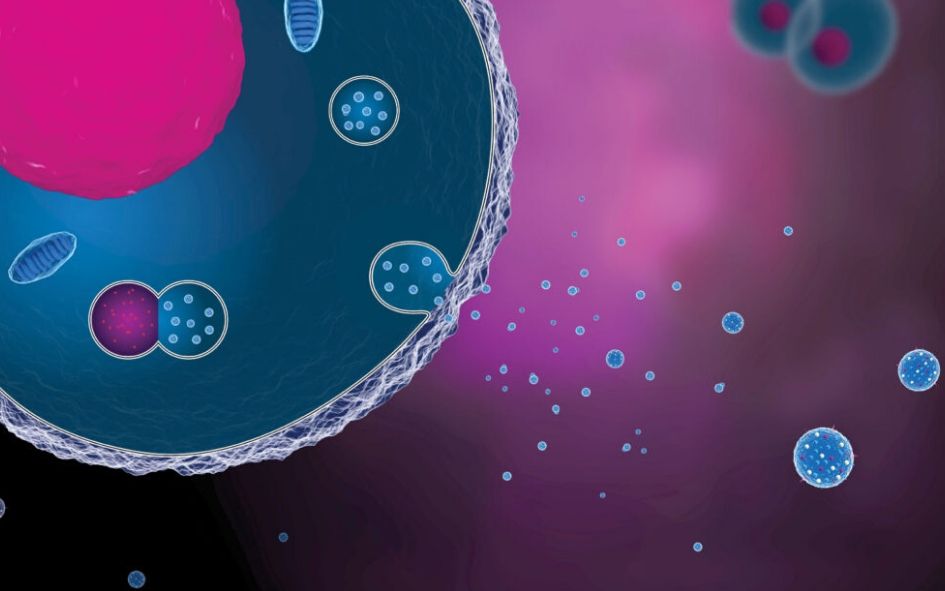Exosome therapy is becoming increasingly popular and is widely advertised. But, what are exosomes? What is exosome therapy? Is exosome therapy effective? Let’s dig in.
What are Exosomes?
Exosomes are small packets of information excreted by living cells (1). Exosomes are how cells communicate with one another. They contain critical information for cells. This information may include how to reprogram a cell or how to accelerate cell growth. Exosomes also have a role in transporting molecules such as proteins and lipids, DNA and RNA. In doing so the can alter the function of the targeted cells.
Exosomes are present in most bodily fluids which include blood, urine, saliva, synovial fluid amniotic fluid, semen, and breast milk. They are released in high quantities from rapidly growing cells. Exosomes have also been shown to act as vehicles for disease. They may contain cargo such as amyloid B, a neurodegenerative associated peptide linked to Alzheimer’s disease (2)
To better understand exosomes please click on the video below.
What Is Exosome Therapy?
The basic idea behind exosome therapy is that by using the messaging cells produced by stem cells (exosomes) you can get rid of the need for the actual stem cells (3). The messaging cells are isolated and used as “therapy”. Unfortunately as discussed in the video stem cells sense their local environment and send out very specific repair messages to other cells based upon this information. Using the specific repair messages (the exosomes) without taking into consideration the local environment is a huge problem (4).
Are Exosomes Stem Cells?
Stem cells are cells that can repair tissue (5). They can do this by one of two ways:
- changing into the needed damaged cell type which is called differentiation.
- sending packets of information to the damaged tissue on how to specifically repair the damaged tissue. These very specific packets of information are called exosomes.
Exosomes are the specific instructions sent by the stem cells. Hence exosomes are NOT stem cells.
Is Exosome Therapy Effective?
Exosomes hold great clinical promise. Unfortunately, exosome and their role in the body are poorly understood. Much remains to be learned about the biological significance of exosomes and their role in disease. Like stem cells, platelets also produce exosomes which are rich cellular information (6). Which type of exosome is needed for specific repair is unknown. There are many different types of exosomes with different functions.
Clinical Exosome Studies
There are multiple studies that demonstrate the effectiveness of both PRP and bone marrow-derived stem cells in the treatment of knee arthritis. These are high-level studies published in peer-reviewed journals. Patient safety, complications, and improvement in pain and function have been critically studied. There are no such studies validating the use of exosomes in knee arthritis. In fact, there are no exosome studies for any clinical condition.
Legal?
Is exosome therapy legal? They require more than the minimal manipulation allowed by the FDA. As such exosomes and the vendors selling such products may come to the attention of the FDA. A recent FDA safety letter highlighted the following:
- serious adverse events in patients who were treated with exosomes
- there are no FDA approved exosome products
- clinics deceiving patients with unsubstantiated claims about products’ ability to prevent, treat or cure various conditions.
- Exosomes used to treat diseases and conditions in humans are regulated by FDA as drugs and biologic products.
In Conclusion
Exosomes are small packets of information excreted by living cells. Major functions are cell communication and molecule transport. Exosomes are present in most bodily fluids and released in high quantities from rapidly growing cells. They have also been shown to act as vehicles for disease. Exosome therapy isolates the messaging cells without the parent stem cell. Stem cells factor into the cell messaging the local environment which is critical. There are no clinical research studies on exosomes for specific conditions such as knee or hip arthritis. Recent FDA safety notification warns of adverse events from exosome and deceptive claims. If stem cells or platelets both produce exosomes why use just the messager cell (exosome) when both stem cells and platelets are available, are clinically effective and very importantly, have the parent cell present to factor in the multiple issues of the local environment.
____________________________________________________________
1.Vakhshiteh F, Atyabi F, Ostad SN. Mesenchymal stem cell exosomes: a two-edged sword in cancer therapy. Int J Nanomedicine. 2019;14:2847–2859. Published 2019 Apr 23. doi: 10.2147/IJN.S200036
2.Lim YJ, Lee SJ. Are exosomes the vehicle for protein aggregate propagation in neurodegenerative diseases. Acta Neuropathol Commun. 2017;5(1):64. doi: 10.1186/s40478-017-0467-z.
3.Yin K, Wang S, Zhao RC. Exosomes from mesenchymal stem/stromal cells: a new therapeutic paradigm. Biomark Res. 2019;7:8. Published 2019 Apr 4. doi: 10.1186/s40364-019-0159-x
‘4.Kusuma GD, Carthew J, Lim R, Frith JE. Effect of the Microenvironment on Mesenchymal Stem Cell Paracrine Signaling: Opportunities to Engineer the Therapeutic Effect. Stem Cells Dev. 2017 May 1;26(9):617-631. doi: 10.1089/scd.2016.0349
5.Berebichez-Fridman R, Montero-Olvera PR. Sources and Clinical Applications of Mesenchymal Stem Cells: State-of-the-art review. Sultan Qaboos Univ Med J. 2018;18(3):e264–e277. doi: 10.18295/squmj.2018.18.03.002
6.Yao Y, Sun W, Sun Q, et al. Platelet-Derived Exosomal MicroRNA-25-3p Inhibits Coronary Vascular Endothelial Cell Inflammation Through Adam10 via the NF-κB Signaling Pathway in ApoE-/- Mice. Front Immunol. 2019;10:2205. Published 2019 Oct 2. doi: 10.3389/fimmu.2019.02205
